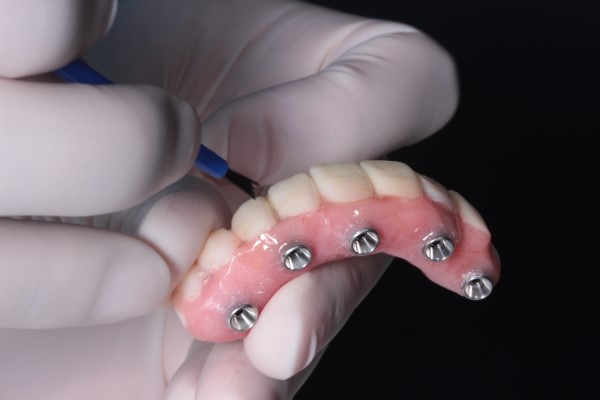4 Methods for Caring for Implant Supported Dentures

Common complaints against traditional dentures are that they move around, fall out, and prevent you from eating certain foods. Implant-supported dentures, or dentures secured by artificial anchors embedded in your jaw bone, have helped address these familiar grievances. The process does require a little time for healing and recovery, but many people find that this is well worth the benefits this approach provides.
Typically, four to six implants are surgically inserted below the gum line in the upper and/or lower portions of the mouth. These metal rods will fuse with the bone underneath as they heal, resulting in a highly stable and supportive base for your new set of dentures. After a few months, the dentures can be securely fastened to the implants, snapping into place for a stable fit.
The design of implant supported dentures means many patients no longer have to modify their diets to prevent embarrassing denture slips. The secure fit can also give many people improved confidence. Perhaps most importantly, this treatment approach helps minimize bone loss in the jaw. This reduces the risks of bone weakness, deterioration, and damage as well as changes in face shape over time.
If you need dentures to restore missing or damaged teeth, implant supported ones have many advantages over the traditional style. However, this type of denture takes some special care. In addition to seeing a dentist for routine checkups, proper hygiene practices at home are essential.
4 ways to take care of dentures supported by implants
Caring for dentures supported by implants varies slightly depending on whether they are fully fixed or removable. Generally though, caring for your dentures is much like caring for natural teeth with a few distinctions.
1. Brushing
Brushing dentures is a little different from brushing natural teeth. One important difference is the type of toothbrush you use. Dentures are usually not as strong as original teeth, so use a soft bristle brush to avoid damaging them. Talk to your dentist about what type of toothpaste, if any, to use when brushing as well. Whitening agents and other abrasives in some toothpaste may damage denture appearance and fit. If your dentures are removable, you may want to take them out to brush them, but always keep them over a bowl of water or a towel in case you drop them.
2. Flossing and rinsing
Many dentures will not stand up to string-style flossing techniques. Instead, you will want to use a water flosser to get at hard-to-brush places where plaque, bacteria, and food particles end up. This method is preferred for both removable and fixed denture types. Rinse with an appropriate anti-bacterial mouthwash too. Again, avoid whitening mouthwashes and speak with your dentist beforehand to ensure he or she approves of your mouthwash choice.
3. Using denture cleansers
Some traditional denture cleaners also work well for removable implant-supported dentures. Many of these denture-specific cleansers are effervescent to help gently power off food particles, bacteria, and stains. Usually, you want to soak your removable dentures in these solutions overnight. Most dentures, including removable implant-supported ones, should stay consistently wet or moist, so never leave them sitting out dry for long periods.
4. Taking regular trips to your dentist
When it comes to tooth and mouth care, regular dental checkups and cleanings are important. With dentures, these routine trips are even more essential though, especially for the perpetually fixed variety. If your dentures are permanent style ones, then only a dentist will be able to remove them to deep clean and care for them. You will need to care for them yourself just as you would for normal teeth, but your dentist will have to take them out and thoroughly clean both the overdentures and the implants themselves at least once a year. Your dentist may even move you to a two or three times per year rotation.
Conclusion
Taking care of implant-supported dentures is just as important as and fairly similar to caring for natural teeth with a few deviations. When combined with the perks of a more secure fit and less bone loss, the advantages of this treatment option can make it very appealing. Still, you must be a good candidate for the procedure. Always consult your dentist and follow any advice he or she offers for your specific set of dentures and circumstances to help ensure they look good, feel good, work right, and last.
Request an appointment here: https://www.mytotaldentistry.com or call McCarthy Dentistry at (740) 546-5178 for an appointment in our Marietta office.
Check out what others are saying about our dental services on Yelp: Implant Supported Dentures in Marietta, OH.
Recent Posts
If you are missing several teeth on the jaw, you might consider opting for implant supported dentures. These offer an innovative solution to missing teeth and are considered more reliable than regular dentures. People were generally satisfied with replacing missing teeth with dentures. However, experts have incorporated a new and improved solution for missing teeth…
In recent years, implant supported dentures have become a popular restorative option due to better retention than traditional replacement teeth. Typically, four implants are placed in the jawbone and a denture snaps into place on the implant posts. They can be used to replace upper or lower teeth. Patients can smile and eat with more…
If you are thinking of getting dentures, you may want to consider implant supported dentures. These dentures offer many benefits, including good stability and even a boost of self-confidence. These types of dentures allow you to easily eat your favorite foods. Read on to learn more.Implant supported dentures rest on a set of implants that…
There is no question that implant supported dentures have a lot to offer. For qualifying individuals, these dentures look and feel amazing. In fact, these also function like normal teeth. Other than avoiding sticky foods, people can eat just about anything. Compared to a traditional appliance, the implant version makes more sense.Implant supported dentures consist…


